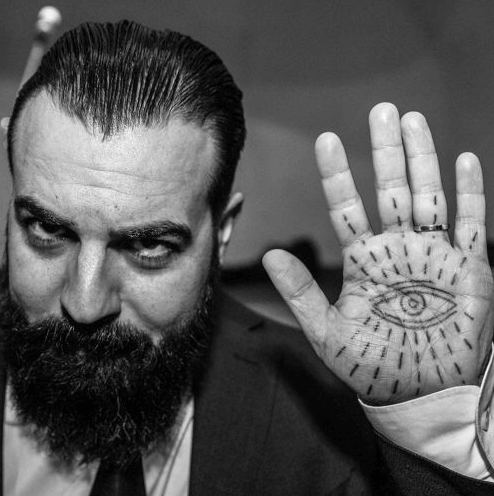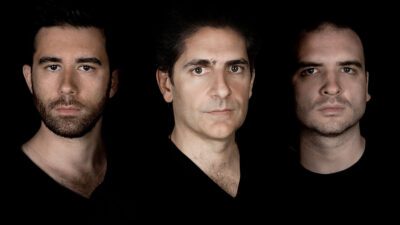“I Love New York, But I Love Not Being in New York”: Talking with Jon DeRosa

Jon De Rosa. Photo: Ivy Augusta
The music world isn’t necessarily awash with crooners like it was once was. In the 1960s, for pretty much a blip on the timeline of pop-music, The Beach Boys and Moody Blues made elegant, vocal-forward songwriting a primary musical device. Listening to these bands today often feels like you’re caught in a wind-tunnel. Spin one of their records and your ears start humming to the gentle, yet totally impressive vocal patterns present on every track.
Fast forward to 2015 and you have Jon DeRosa, a modern-day chamber pop singer whose thick, bellowing voice is a direct byproduct of 60s-sunshine pop. With his serene style, De Rosa carries a certain niche tradition along that’s made even more remarkable by one fact: He’s completely deaf in his right ear.
A native of New Jersey and a former New York City resident for 18 years, DeRosa currently lives in Los Angeles and released a new record, Black Halo, last month. He’s making a return to NYC as he plays St. Vitus this Wednesday June 3rd. His music, which you can stream here, is soothing and pleasant, but hinges on mystical and sometimes even grim subject matter. We can’t recommend his set at Vitus enough. Here, DeRosa talks about how living in NYC engendered a growing sense of alienation over time, and about how his grandfather, a former big band leader, inspired him to become the singer he is today.
Brooklyn Magazine: What was it about being in New York City that made you feel so isolated?
John DeRosa: I’m not necessarily sure that isolation is the right word. I just think after a certain amount of time I didn’t feel as integrated into the landscape anymore. I guess that kind of leads to a feeling of alienation and that’s where the isolation comes in. It wasn’t like a social isolation or anything like that. I just think that when you stop identifying with your surroundings, it can kind of make you feel a little alien.
How did your grandfather being a big band leader/singer have an effect and influence on you growing up?
I was really close to him and he was always kind of teaching me music. Music was always all around me and, you know what it’s like growing up–maybe the music in your household isn’t the kind of stuff you appreciate at the time or that you feel really drawn to in the moment, but something about it seeps into your subconscious on some level and when you grow up something flips a switch. I think for me, that’s kind of the way it was.
How did you start to lose the hearing in your right ear, was it a gradual process or was it the result of an accident?
No it was a sudden, freak-thing. I was at NYU and I had just switched my major from archaeology to music [laughs], I was sitting on the couch at my Mom’s house one day and my hearing just went out. Almost like when you get water in your ear, it just kind of “went out.” It was months and months of doctors and trying to figure it out. In the end, the only possible diagnoses I was given was that, it’s possible to have a painless ear infection where don’t know there’s anything wrong until the damage is so severe it destroys your nerves. That seems to be what happened to me. I don’t think it’s a very common thing and to be honest, I don’t even know if that’s what really happened, but that’s what I was told.
What I thought was really interesting in terms of musicians with limited senses, is that blindness is usually associated with some sort of enhancement of musical ability, like it affords people an additional auditory sense. Do you find being deaf has helped your musical ability in any way?
Honestly I don’t think so [laughs], I don’t think there’s been a direct correlation [between deafness and singing] in that regard, I think maybe it’s improved other senses in other ways, and it’s definitely improved my hearing on the other side. I’m not quite sure if it’s enhanced some kind of sixth sense yet, though.
People are saying that your music has “west coast sound,” do you think that’s an apt characterization? Why do you think people are saying that?
I think that for people who might be familiar with my work over the years, there’s a definite lightness and expansiveness in the new record. I think it’s the approach and the overall feeling of it. I think people might identify the previous records as a little darker, a little denser, and listening to this next to that, I think it’s noticeably lighter.
What’s it going to be like coming back to New York? Is it going to bring up bad vibes or will it be a nice homecoming?
No I don’t have any bad vibes about New York. I love New York, but I love not being in New York. I still consider it my home though, and I think it’s an amazing place. I’ve been back a few times and I think it’s really fun to be there as a visitor instead of a resident sometimes.
You might also like 



















